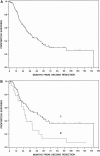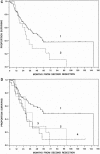Second liver resections are safe and effective treatment for recurrent hepatic metastases from colorectal cancer: a bi-institutional analysis
- PMID: 12035044
- PMCID: PMC1422517
- DOI: 10.1097/00000658-200206000-00015
Second liver resections are safe and effective treatment for recurrent hepatic metastases from colorectal cancer: a bi-institutional analysis
Abstract
Objective: To determine the value of repeat liver resection for recurrent colorectal metastases to the liver.
Summary background data: Liver resection represents the best and a potentially curative treatment for metastatic colorectal cancer to the liver. After resection, however, most patients develop recurrent disease, often isolated to the liver.
Methods: This study reports the combined experience of repeat liver resection for recurrent liver metastases at an American and a European surgical oncology center. Patients were identified from prospective databases and records were retrospectively reviewed. A total of 126 patients (American n = 96, 1986-2001; European n = 30, 1985-1999) underwent repeat liver resection. Patient characteristics were similar in the two institutions. Median follow-up from first liver resection was 88 and 105 months, respectively.
Results: Operations performed included 90 minor resections and 36 resections of a lobe or more. The 1-, 3-, and 5-year survival rates were 86%, 51%, and 34%. There were 19 actual 5-year survivors to date. By multivariate regression analysis (proportional hazard model), more than one lesion and tumor size larger than 5 cm were independent prognostic indicators of reduced survival. The interval between the first and second liver resection was not predictive of outcome.
Conclusions: Repeat liver resection for colorectal liver metastases is safe. Patients with a low tumor load are the best candidates for a repeat resection. In well-selected patients, further resection of the liver can provide prolonged survival after recurrence of colorectal liver metastases.
Figures


References
-
- Gilbert HA, Kagan AR. Metastases: incidence, detection, and evaluation without histologic confirmation. In Weiss L, ed. Fundamental aspects of metastasis. Amsterdam: North-Holland, 1976: 385–405.
-
- Jaffe BM, Donegan WL, Watson F, et al. Factors influencing survival in patients with untreated hepatic metastases. Surg Gynecol Obstet 1968; 127: 1–11. - PubMed
-
- Bengmark S, Hafstrom L. The natural history of primary and secondary malignant tumors of the liver. Cancer 1969; 23: 198–202. - PubMed
-
- Cunningham D, Pyrhonen S, James RD, et al. Randomized trial of irinotecan plus supportive care versus supportive care alone after fluorouracil failure for patients with metastatic colorectal cancer. Lancet 1998; 352: 1413–1418. - PubMed
Publication types
MeSH terms
LinkOut - more resources
Full Text Sources
Medical

